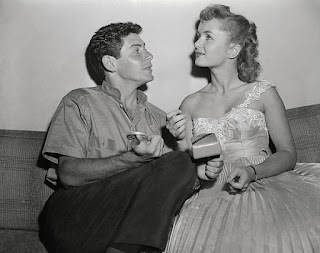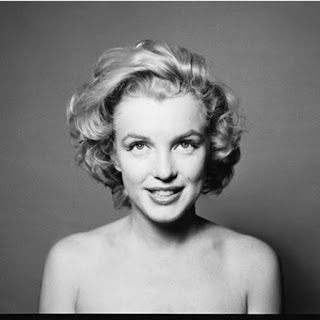
Divorce is never pleasant. It’s filled with heartbreak, with a sense of personal defeat. It’s seldom a step that’s taken lightly—almost always a last resort, a way out when all else has failed. When it comes, the cost is heavy—in loss of personal pride, in emotional exhaustion, and often in dollars. But if the need is urgent, these penalties must be faced. The trouble with such penalties is that they’re not paid off and then forgotten like monthly bills. The pinch is felt for a long time—and the over-all effect is sometimes crippling. For instance, can John Wayne afford to marry again? And what was it really that murdered the romance of Jane Powell and Gene Nelson? You’ll find the answers in the Ledger of love and among a trail of broken hearts in Hollywood, and you’ll see that, for movie stars in particular, the cost of leaving is terribly high. John Wayne has to clear $150,000 a year before he can draw so much as a breath for himself. His first wife, the former Josephine Saenz, gets ten per cent off the top of the cream from everything the Duke makes. And he makes a million dollars a year—before taxes, that is. John’s other wife, the lady known as Chata, is receiving $50,000 a year from the ex-mate she loathes, for the next ten years. And is Mr. Wayne complaining? No siree. He’s a man who just loves to be married and to heck with the price.

I was glad when Dean Martin kissed and made up with his wife Jeanne. For one thing, he just couldn’t afford another divorce financially. With two children now and four by his first wife, the handsome half of the Martin and Lewis combo, not only pays for their care and feeding, but gives three thousand dollars a month in alimony to bride Number One. Thirty-six thousand a year! But much more important—his second marriage is too good to be tampered with. The emotional bills for Jeanne and Dean would have been much more serious than the financial, if they had made the mistake of separating. This reminds me of George Raft who has been paying alimony for twenty-five years to a wife he hasn’t seen since the big crash of his marriage. George once told me, “This is like throwing thousands of dollars out the window.” I guess it’s the way Virginia Mayo felt when she agreed to pay Michael O’Shea’s first wife some $25,000 as a settlement for back alimony. Mike assured me later, however, that he sold some property of his own to reimburse his ex-wife. And in both cases, the dollars paid for peace of mind.

It would have been much cheaper for Errol Flynn to have stayed with his first spouse, the fiery Lilli Damita, than to let his emotions have such free play. Errol was so anxious to be a dashing bachelor again, he agreed to pay Lilli the $300,000 she demanded for his freedom. Plus $30,000 a year until she married again. But she hasn’t remarried. I had dinner with Errol in New York shortly after that divorce, and he swore he would never take the leap again. Well Pat Wymore, wife Number Three, has money of her own—and no matter what happens, she isn’t the type to harass a feller when he’s down in the mouth financially. But Wife Number Two, Nora Haymes, is determined to collect for unpaid support of their two daughters. One day I’ll have to ask Errol, “Was the high cost of loving worth it?” You’d think the high price of disillusionment would stop couples from taking a chance on Love. But it never has, and it never will—thank goodness. —PHOTOPLAY MAGAZINE (MARCH 1954)

Early on, Evelyn Keyes describes in her memoirs arriving in California and walking what seemed like hundreds of miles to studio lots, looking for opportunities to be discovered — or at least leave her name and number, in case a dancer was needed for an upcoming project. She ended up signing with Paramount, where she began to land a few roles, but was also asked to change a few things about herself. Cecil B. DeMille, for instance, insisted that she lose her Southern accent immediately and begin taking acting lessons instead of continuing with dance. Evelyn Keyes was explicit about what she experienced when she was invited into Fredric March's dressing room during the making of The Buccaneer. It was her first film and first day on a set and she had a difficult time with Mr. DeMille and Fredric March had tried to help her and he invited her into his dressing room for, what she thought, was to give her some tips. She admits she was breathtaken by his looks and the tight white pants he was was wearing. He sat her down on the sofa next to her and looked deeply in her eyes and picked her hand up and placed it on his crotch. She was saved by an assistant director knocking on the door calling March to the set--he removed her hand and got up and invited her to stay until he came back--she fled fast.

Claudette Colbert called March the "worst womanizer" she knew in Hollywood, because of his constant feeble attempts to seduce her. Elia Kazan, who worked with him as a director on the stage and in the film Man on a Tightrope recalls in his memoirs having to save March from a jealous husband over a maid he had seduced while shooting the film on location. Robert Wagner claimed in his autobiography that he had copped a feel of his then wife Marion Marshall's breast while pretending to admire some jewelry around her neck! However, Sylvia Sidney said that March had this reputation but "Freddie was happily married--he'd tease me by saying, 'look at those boobs' but it was all for fun." Then Rose Hobart once said, "he had the worst reputation, but he was probably one of the most faithful husbands in Hollywood--Oh, he'd kiss somebody behind the set--but that was as far as he went." So he seemed to be frisky and maybe a bit lecherous at times, but given most of the stories he wasn't very successful!

Keyes' personal life often overshadowed her acting career. Besides her often turbulent marriages to Artie Shaw and directors John Huston and Charles Vidor, she lived with the flamboyant producer Mike Todd for three years during his preparation and filming of "Around the World in 80 Days." She played a cameo role in the movie and helped on publicity. Todd sent her to the premiere in Caracas, then called her suddenly from Paris with the message: "Listen, I have to tell you. I've fallen in love with Elizabeth Taylor." Keyes philosophized in 1977. "The good part was that I invested all my money in `Around the World in 80 Days,' and that set me up for life." Indeed, Keyes owned 5% of Mike Todd's film company. "I vaguely knew who Mike Todd was, a producer of shows in New York. I had seen one of them, Star and Garter, with Gypsy Rose Lee doing her strip act right there on Broadway. A promoter, I believe they called him," she wrote when she was first introduced to Todd. "He was busy getting together a new film technique to be called Todd-AO, a combination of his chutzpah and a scientist at American Optical: a new wide lens camera, to replace the recently introduced Cinerama."

Keyes gave a thorough account of her romances and marriages in her 1977 autobiography, "Scarlett O'Hara's Younger Sister." Her role in the 1939 classic led to a contract at Columbia Pictures and stardom. Among her notable roles: as Robert Montgomery's lover in "Here Comes Mr. Jordan" (1941), the Ruby Keeler role as Al Jolson's wife in "The Jolson Story" (1946), and as Dick Powell's wife in "Mrs. Mike" (1949). She also starred in dark pictures that were later praised by movie critics as prime examples of film noir: "Johnny O'Clock" (1947), "The Killer That Stalked New York" (1950), "The Prowler" (1951), "99 River Street" (1953) and "The Big Combo" (1955). Keyes' marriages and divorces made her the darling of gossip columns and fan magazines. Her first marriage, to a handsome Englishman and heavy drinker named Barton Bainbridge, ended in headlines when he fatally shot himself during a painful separation. Charles Vidor, a handsome Hungarian who directed her first Columbia film, "The Lady in Question," became romantically involved with Keyes, though both were married at the time. When her husband committed suicide and Vidor's wife, actress Karen Morley divorced him, Vidor and Keyes married.

Husband No. 3 was John Huston. She was impressed when they met at a Hollywood dinner party, and more impressed when he took her afterward to his Tarzana horse ranch and made no effort to seduce her. Their marriage in 1946 led to an adventurous life. Just one of the examples she recalled in 1971 involved Huston returning home from the 1949 film "We Were Strangers," with a gift from actress Jennifer Jones, a pet chimpanzee. The Huston marriage did end in 1950, however, and Keyes sought analysis to recover from the failure. Her conclusion: "I was always looking for the same man—a strong father figure." Keyes was born in Port Arthur, Texas, in 1916, according to state birth records; some references give a later year. She grew up fatherless (her father died when she was just 3) and poor in Atlanta.

A glowing blond beauty with an alluring figure, she danced in nightclubs and at 17 set out for Hollywood. Cecil B. DeMille signed her to a seven-year contract and cast her in "The Buccaneer." After a few minor roles at Paramount, she appeared in "Gone With the Wind" and then moved to Columbia, where her career blossomed. Among her most notable roles: as Robert Montgomery's lover in "Here Comes Mr. Jordan" (1941), the Ruby Keeler role as Al Jolson's wife in "The Jolson Story" (1946), as Dick Powell's wife in "Mrs. Mike" (1949) and "The Prowler" (1951) with Van Heflin. Keyes expressed her opinion that Mrs. Mike was her best film character (in her autobiography Scarlett O'Hara's Younger Sister: My Lively Life In and Out of Hollywood, published in 1977), oddly connected with a surreptitious affair with her co-star Dick Powell. Sometimes Keyes mentions him as Powell, other times as "the co-producer" (Powell was also producer of Mrs Mike.)

"After Harry Cohn dropped me with a resounding thud, I enjoyed my new-found freedom, blissfully doing whatever I chose to do. I had already been cast in Johnny O’Clock, with Dick Powell, which was proven to be a delightful experience. It was Robert Rossen’s first directorial job and maybe Harry Cohn hoped Rossen would tumble downhill and take me with him. Which, fortunately didn't happen." Amidst the production of Johnny O'Clock, she married impulsively John Huston in Las Vegas. Back on the set, she felt Powell acted somehow jealous. "It was weird. Perhaps it was just the hyped-up, spaced-out mood the benzedrine caused, or maybe only imagination. But it seemed strange, all around me that day. There were congratulations, but with distinct lack of enthusiasm. Dick Powell was particularly lukewarm, almost resentful, as if I had double-crossed him." Keyes's onscreen interactions with Powell in Johnny O'Clock show that an intimate spark lighted between them.
Two years later, they were reunited for
Mrs. Mike. While she was announcing an imminent divorce from Huston, she wrote: "It was a year of madness. A frantic, erratic montage of ups and downs, ins and outs. Another picture helped postpone my decision; I was loaned to Dick Powell for a flick he was producing and starring in called
Mrs. Mike. I played a Boston girl who marries a Mountie, goes north with him and suffers various hardships. Louella Parsons said I would win the Academy Award. Wrong." Keyes consulted with Huston about the script. Powell didn't warm up to Huston. It seems Keyes had a huge crush on Powell and, given the scarce details she offers about their liaison, she probably was in love with him.
She clearly appreciated his gentleness. Among her list of lovers, she recalls Dick Powell and Sterling Hayden more fondly than the rest. Most of her marriages ended because of her lack of desire to start a family, although that would have meant adopting, since she could not have children of her own. Keyes caustically assesses the faults of her partners, feeling pity for her first husband, and disappointment with Vidor and Huston's womanizing ways. She seems ambivalent towards Kirk Douglas (a dominating personality) and her last (controlling) husband Artie Shaw; she thinks Mike Todd was possessive and uneducated, and hates Harry Cohn with fierce intensity, whom she considered "repulsive" and "annoyingly stupid."
Mrs Mike was released on December 23, 1949. That had been a bad year for Powell & June Allyson due to the incessant rumors of her affair with Dean Martin, so it's very likely Powell succumbed to Keyes' charms. As surmised by Nick Tosches in
Dino: Living High in the Dirty Business of Dreams, Martin could be a bona-fide weasel and was bent on wooing Allyson, the America Sweetheart. Virginia Gregg, who played Dick Powell's girlfriend Helen Asher in the radio program
Richard Diamond: Private Detective, observed an irate Powell during that period.

Before marrying June Allyson, Dick Powell had allegedly a sexual affair in 1945 with actress Virginia Field (Waterloo Bridge), who was then married to Paul Douglas (Clash by Night) and had certain resemblance to Evelyn Keyes. Apparently, Douglas discovered his wife in bed with Dick Powell and he divorced her in 1946. Virginia Field was a great looking woman but difficult to work with. She reportedly knocked down David O. Selznick at his office; as he was trying to 'know her better' she hit Selznick on the head with a decanter. Columnist Walter Winchell once dubbed her "the most beautiful blonde in the world." Dick Powell labeled Virginia as "too beautiful" in Screen magazine (February 1951). Although Virginia Field certainly had the talent to become a top film star, it is believed that her candid opinions about others stars did her in. Disparaging remarks about actress Loretta Young ("phony" and "two-faced") and Betty Hutton ("moody") hurt her reputation in Hollywood. —Sources: "Scarlett O'Hara's little sister" (1977) by Evelyn Keyes and www.silverscreenoasis.com
.jpg)
.jpg)
.jpg)


.jpg)





.jpg)
.jpg)



























.jpg)
.jpg)







_NRFPT_03%20(1).jpg)
_NRFPT_07.jpg)












